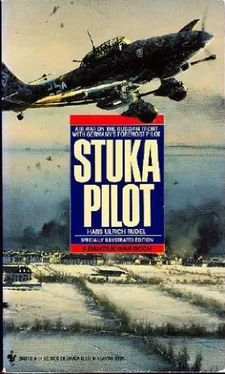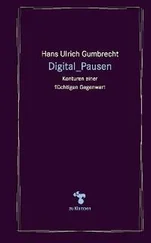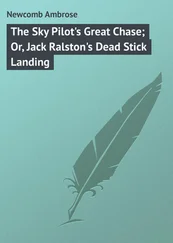I am very lucky again in the first days of May. I have an appointment with Field Marshal Schörner, and before keeping it want to look in on my way at Air Command H.Q. in a castle at Hermannstadtel, about fifty miles east of us. I fly there in a Fieseler Storch and see that the castle is surrounded by tall trees. There is a park in the middle on which I think I can land. My faithful Fridolin is behind me in the plane. The landing comes off all right; after a short stay to pick up some maps we take off again towards the tall trees on a gentle rise. The Storch is slow in gathering speed; to help her start I lower the flaps a short distance before the edge of the forest. But this only brings me just below the tops of the trees. I give the stick a pull, but we have not sufficient impetus. To pull any more is useless, the aircraft becomes nose-heavy. I already hear a crash and clatter. Now I have finally smashed my stump, if nothing worse. Then everything is quiet as a mouse. Am I down on the ground? No, I am sitting in my cockpit, and there, too, is Fridolin. We are jammed in a forking branch at the top of a lofty tree, merrily rocking to and fro. The whole tree sways back and forth with us several times, our impact was evidently a bit too violent. I am afraid the Storch will now play us another trick and finish by tipping the cockpit over backwards. Fridolin has come forward and asks in some alarm: “What is happening?”
I call out to him: “Don’t budge or else you will topple what remains of the Storch off the tree into a thirty foot drop.”
The tail is broke off as well as large pieces of the wing planes; they are all lying on the ground. I still have the stick in my hand, my stump is uninjured, I have not knocked it against anything. One must have luck on one’s side! We cannot get down from the tree, it is very high and has a thick, smooth trunk. We wait, and after a time the General arrives on the scene; he has heard the crash and now sees us perched up aloft on the tree. He is mightily glad we got off so lightly. As there is no other possible way of getting us down he sends for the local fire brigade. They help us down with a long, extending ladder.
The Russians have by-passed Dresden, and are trying to cross the Erzgebirge from the north so as to reach the protectorate and thus outflank Field Marshal Schörner’s army. The main Soviet forces are in the Freiberg area and southeast of it. On one of our last sorties we see south of Diepoldiswalde a long column of refugees with Soviet tanks going through it like steam rollers, crushing everything under them.
We immediately attack the tanks and destroy them; the column continues its trek towards the south. Apparently the refugees hope to get behind the protecting screen of the Sudeten mountains where they think they will be safe. In the same area we attack some more enemy tanks in a veritable tornado of flak. I have just fired at a Stalin tank and am climbing to 600 feet when, looking round, I notice a drizzle of bits and pieces behind me. They are falling from above. I ask:
“Niermann, which of us has just been shot down?” That seems to me the only explanation and Niermann thinks the same. He hurriedly counts our air craft, all of them are there. So none of them was shot down. I look down at my Stalin and see only a black spot. Could the explanation be that the tank exploded and the explosion flung up its wreckage to this height? After the operation the crews which were flying behind me confirm that this tank blew up with a terrific explosion into the air behind me; the bits and pieces which I saw raining down from above were from the Stalin. Presumably it was packed with high explosive, and its mission was to clear tank barriers and other obstacles out of the way of the other tanks. I do not envy Niermann on these operations, for now flying is certainly no life insurance; if I am forced to land anywhere there is no longer any chance of making an escape. He flies with an incomparable placidity; his nerve amazes me.
On the 7th May there is a conference of all Luftwaffe commanders in Schörner’s army zone at Group H.Q. to discuss the plan which has just been released by the Supreme Command. It is proposed gradually to retire the entire Eastern front, sector by sector, until it is parallel with the Western front. We perceive that very grave decisions are about to be taken. Will the West even now recognize its opportunity against the East or will it fail to grasp the situation? Opinions among us are divided.
On the 8th May we search for tanks north of Brüx and near Oberleutensdorf. For the first time in the war I am unable to concentrate my mind on my mission; an indefinable feeling of frustration suffocates me. I do not destroy a single tank; they are still in the mountains and unassailable there.
Wrapped in my thoughts I head for home. We land and go into the flying control building. Fridolin is not there; they tell me he has been summoned to Group H.Q. Does that mean…? I jerk myself sharply out of my depression.
“Niermann, ring up the squadron at Reichenberg and brief them for a fresh attack and fix the next rendezvous with our fighter escort.” I study the map of the situation… what is the use? Where is Fridolin all this time? I see a Storch land outside, that will be he. Shall I dash out? No, better wait in here… it seems to be very warm for this time of the year… and the day before yesterday two of my men were ambushed and shot dead by Czechs in civilian clothes… Why is Fridolin away so long? I hear the door open and somebody comes in; I force myself not to turn round. Someone coughs softly. Niermann is still speaking on the telephone… so that was not Fridolin. Niermann is having trouble getting through… it is a funny thing I notice that today my brain is registering every detail very sharply… silly little things without the least significance.
I turn round, the door opens… Fridolin. His face is haggard, we exchange glances and suddenly my throat is parched. All I can say is: “Well?”
“It’s all over… unconditional surrender!” Fridolin’s voice is scarcely more than a whisper.
The end… I feel as though I were falling into a bottomless abyss, and then in blurred confusion they fall pass before my eyes: the many comrades I have lost, the millions of soldiers who have perished on the sea and in the air and on the battlefield… the millions of victims slaughtered in their homes in Germany… the oriental hordes which will now inundate our country… Fridolin suddenly snaps out:
“Hang up that blasted telephone, Niermann. The war is over!”
“We shall decide when we stop fighting,” says Niermann.
Someone guffaws. His laughter is too loud, it is not genuine. I must do something… say something… ask a question…
“Niermann, tell the squadron at Reichenberg that a Storch is landing in an hour from now with important orders.”
Fridolin notices my helpless embarrassment and goes into details in an agitated voice.
“A retirement westward is definitely out… the English and the Americans have insisted on an unconditional surrender by the 8th of May… that is today. We are ordered to hand over everything to the Russians unconditionally by 11 to-night. But as Czechoslovakia is to be occupied by the Soviets it has been decided that all German formations shall retire as fast as possible to the West so as not to fall into Russian hands. Flying personnel are to fly home or anywhere…”
“Fridolin,” I interrupt him, “parade the wing.” I cannot sit still and listen to any more of this. But will not what you have now to do be an even greater ordeal?… What can you tell your men?… They have never yet seen you despondent, but now you are in the depths—Fridolin breaks in upon my thoughts:
Читать дальше












